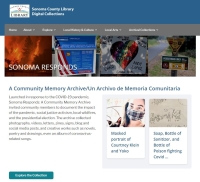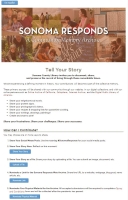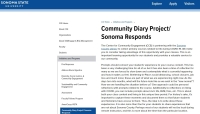Sonoma Responds: A Community Memory Archive
Sonoma County Library
Innovation Synopsis
Sonoma Responds: A Community Memory Archive was a digital project documenting the COVID-19 pandemic’s impact on Sonoma County. Other local events, such as wildfires and social justice protests, were also archived. Community members submitted and preserved their stories, reflections, photographs, videos, artwork and other creative works.
Challenge/Opportunity
Prior to the pandemic, the library had not developed the technology or policy infrastructure to launch a participatory digital archive. Staff designed and established a model for future community projects. With much of the personal experiences about COVID-19 being shared online and through social media, the library used web archiving tools to capture and preserve the most ephemeral historical content. This was a fully bilingual project with all promotion and marketing in Spanish and English.
Key Elements of Innovation
Sonoma Responds featured:
- English and Spanish online portals, including anonymous submission option
- Reflective prompts about life during COVID
- Upload feature for photographs, videos and documents
- Ability to submit websites/blogs to the web archive
- Creative Commons licensing option to allow for broad (re-)sharing of materials
Through a partnership with Sonoma State University’s Center for Community Engagement, the library launched a parallel project to document student experiences, with over 700 submissions.
Achieved Outcomes
- Over 1,000 submissions, including reflections, videos, photos, art, and COVID-related songs and novels set locally.
- Community members enjoyed viewing their content and exploring the work of others.
- Participant feedback:
- “[Sonoma Responds is] really a visionary program.”
- “I'm so proud to be a part of this project.”
- “Thank you so much for your time, as well as your safekeeping history. It's incredibly appreciated.”
- Participants varied in age, including traditional library users and non-library cardholders.



